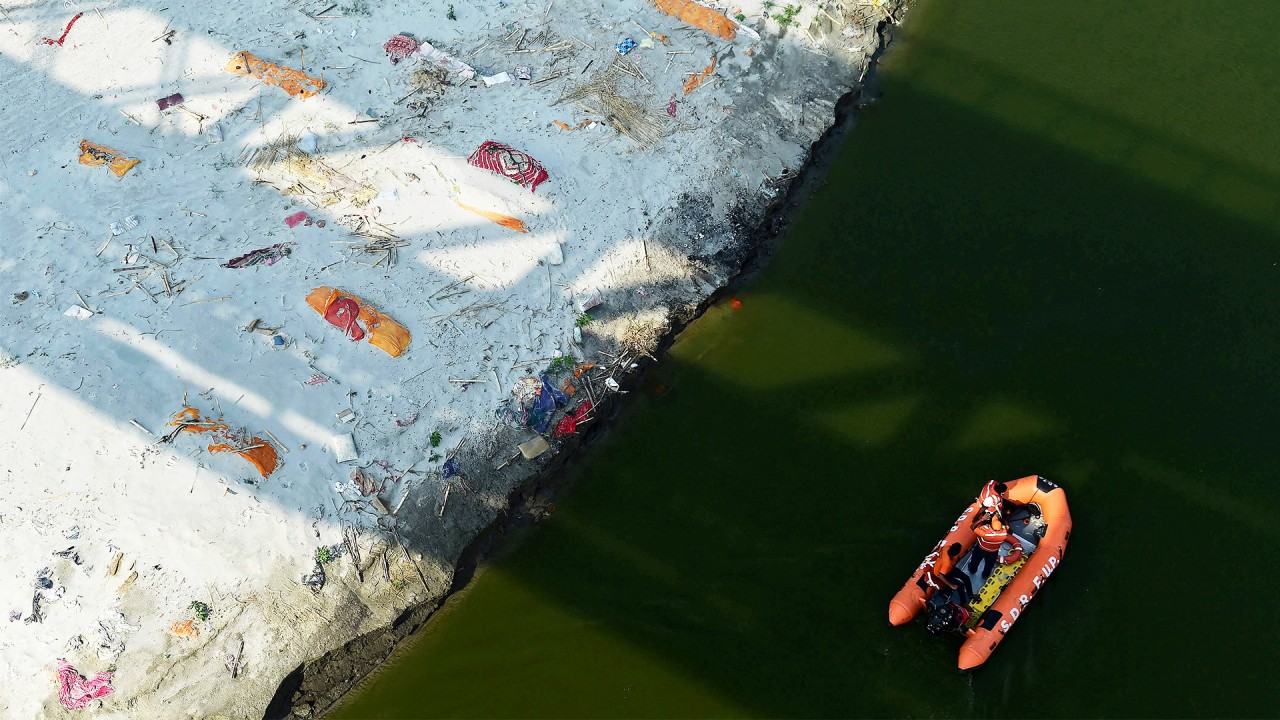
India’s Modi once relied on Facebook and Twitter. Now, is he ‘going the China way’?
- The government is seeking tighter control of digital media amid a wave of discontent over India’s Covid-19 pandemic response and other policies
- As tech firms like Google and WhatsApp prepare to challenge the state’s ‘chilling’ new rules, an observer says India could be leaning towards China’s rulebook
“The government rose to power riding on an information revolution through social media,” said Srinivas Kodali, a researcher with Free Software Movement, a coalition of organisations promoting the adoption of free software.
“They are now concerned that the same social media platforms are being mobilised against them.”
How Modi ally suppressed oxygen shortage reports amid India’s virus crisis
Amid the tide of criticism, the BJP government in February introduced regulations to tighten its control over online content, which came into effect on May 26.

02:11
India passes 300,000 coronavirus deaths as mass graves found along Ganges
Under the Intermediaries and Digital Media Rules, 2021, social media platforms must comply with government orders to remove posts within 36 hours or face criminal liability.
When contacted, India’s Ministry of Electronics and Information Technology spokesperson pointed to its May 26 statement, which said messages would need to be traced only in cases linked to the “prevention, investigation or punishment of very serious offences related to the sovereignty and integrity of India”.
Previously, the ministry described the new rules as a “fine blend of liberal touch with gentle self-regulatory framework”.
Missteps lead India into oxygen shortage amid Covid-19 surge
Shakuntala Banaji, a professor of media, culture and social change at the London School of Economics, said the new rules signalled the Modi government’s intent to “control all political activism”.
“Those challenging the state and its functionaries, or calling out the ‘Hindutva vigilantes’ will be labelled as peddlers of fake news, and even more of them will be imprisoned on false charges,” said Banaji, referring to Hindu nationalists who make up many of Modi’s supporters.
“Even activists who forward certain types of pro-democratic and critical content will find themselves arrested and charged with originating the content and then tied up for years in the Indian criminal justice system.”
Banaji said Modi’s failed Covid-19 response might have pushed the government to save its image as the perception of “Modi as a stable, democratic leader has started to crumble”.
“If they cannot control the narrative, they fear further deterioration and alienation of diplomatic relations,” she said.

01:46
The black fungus nightmare facing India’s coronavirus patients
Social media hits back
Koo, India’s answer to Twitter, on Wednesday said it had submitted details confirming it complied with the new rules. But other firms have indicated they would put up a fight.
WhatsApp, owned by Facebook, is asking the Delhi High Court to declare the rules as a violation of privacy rights.
“Requiring messaging apps to ‘trace’ chats is the equivalent of asking us to keep a fingerprint of every single message sent on WhatsApp, which would break end-to-end encryption and fundamentally undermine people’s right to privacy,” a spokesperson said.
India is WhatsApp and Facebook’s largest market, accounting for more than 530 million and 400 million users, respectively, while Twitter has some 17.5 million users.
Google has approached the same court, saying it should not be subject to the new rules as it was a search engine, and that proactive monitoring of the web could have “a chilling effect” on free speech.
Twitter last week slammed the Modi government for using “intimidation tactics” after its offices in India were raided and its workers threatened with seven-year jail terms for refusing to block tweets the government deemed objectionable.
India blasts New Delhi Chief Minister for false ‘Singapore variant’ claim
Meanwhile, the government’s online credibility has increasingly been called into question.
When senior leaders of the BJP last week shared documents alleging that the opposition Congress party was planning to criticise the government’s handling of Covid-19, Twitter labelled the posts as containing “manipulated media”, after independent fact-checkers found the papers to be fabricated.
Incensed, the Modi government asked the platform to drop the tag, calling it “prejudged and prejudiced”. But Twitter went on to add the label to other posts by BJP leaders who shared the same documents.
An elite anti-terrorism unit of the Delhi Police, run by Modi’s aide and Home Minister Amit Shah, later showed up at Twitter India’s offices, ostensibly to serve a notice, but found the offices shut.
For years now, these platforms have let the Modi government’s supporters get away with the vilest of things
Rohit Chopra, an associate professor at the Santa Clara University’s department of communication, said the social media platforms were not completely “victims”, however.
“When you strike a deal with the devil, at some point, it will backfire,” he said, pointing to Twitter and Facebook’s earlier failure to act on hate speech and abuse.
Just last month, Hasiba Amin, a young Muslim politician from the Congress party, filed a police complaint after Hindu nationalists placed “bids” on her in an “online auction” held on Twitter.
News reports have also revealed Facebook’s commercial ties with the Hindu right, with pages run by the BJP emerging as one of its biggest advertisers in India.
“For years now, these platforms have let the Modi government’s supporters get away with the vilest of things,” Chopra said, although he noted that things were changing.
“With the mainstream media slowly starting to speak up and public anger against the Modi government rising, these tech companies are also taking their cues,” he said.
Is New Delhi using Indian media to attack Nepal as it grows closer to China?
As the battle between the government and big tech continues to intensify, Banaji said both sides were likely to resolve the issues through “behind-the-scene deals”.
Chopra thought the same. “The government is unlikely to implement all the rules, but they will extract key benefits from social media companies, and there might be a line that both companies draw,” he said.
But either way, the tussle was a sign of things to come, said Kodali.
“India is going the China way … where only those technological companies that follow the country’s rules will be allowed to operate,” the researcher said.



